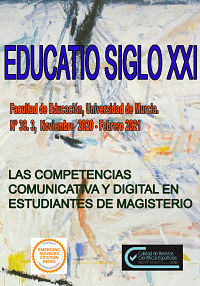The evolution of education in values and social projection in inclusive schools
Abstract
The present paper carries out a critical-descriptive analysis of the evolution of education in values experienced in the Spanish education system. This type of education is looked at through transversal topics of discussion and the development of the competences included in the current legislation, all within the framework of inclusive schools as an alternative to the integrative school. Also, the social projection of education in values present in the schools is described, advocating for the promotion of proper coexistence and peaceful conflict resolution, all within an integral and harmonious development of children and adolescents at a personal and social level.
Downloads
-
Abstract7645
-
PDF (Español (España))5417
References
Bisquerra, R. (2011). Diversidad y escuela inclusiva desde la educación emocional. Recuperado de: http://diversidad.murciaeduca.es/publicaciones/diversa2011/docs/bisquerra.pdf
Bolívar Botía, A. (1995). La evaluación de valores y actitudes. Madrid: Anaya- Alauda.
Buxarrais, M.R. (2003). La formación del profesorado en la educación en valores. Propuesta y materiales. Bilbao: Desclée De Brouwer.
Camps Cervera, V. (1996). Los valores de la educación. Madrid: Anaya- Alauda.
Del Carmen, L. (2004). La atención a la diversidad: una cuestión de valores. En AA.VV. La escuela inclusiva. Prácticas y reflexiones. (47-55). Barcelona: Graó.
Delors, J. (Coord.) (1996). La educación encierra un tesoro. Comisión Internacional sobre la Educación para el siglo XXI. Madrid: Santillana/UNESCO.
Domínguez Chillón, G. (1999). Los valores en Educación Infantil. Madrid: La Muralla.
Dudley Weeks, Ph. D. (1998). 8 Pasos para resolver conflictos. Buenos Aires: Editor, S.A. Javier Vergara.
González Lucini, F. (1994). Temas Transversales y Educación en Valores. Madrid: Anaya-Alauda.
López Melero, M. (2012). La escuela inclusiva: una oportunidad para humanizarnos. Revista Interuniversitaria de Formación del Profesorado, 74 (26,2), 131-160.
Martín García, X. y Puig Rovira, J.M. (2007). Las siete competencias básicas para educar en valores. Barcelona: Graó.
Martínez Rodríguez, J.B. (2005). Educación para la ciudadanía. Madrid: Morata.
Ministerio de Educación y Ciencia (1993). Temas Transversales y Desarrollo Curricular. Madrid: Secretaría de Estado de Educación.
Muntaner Guasp, J.J., Rosselló Ramón, M.R. y De la Iglesia Mayol, B. (2016). Buenas prácticas en educación inclusiva. Educatio Siglo XXI, 34 (1), 31-50.
Ortega, R. y Del Rey, R. (2004). Construir la convivencia. Barcelona: Edebé.
Rodríguez Hidalgo, A.J., Zych, I. y Ortega-Ruiz, R. (2016). El centro y el aula como escenarios de la convivencia. En Ortega-Ruiz, R. y Zych, I. (eds.). Convivencia escolar. Manual para docentes. (27-37). Madrid: Grupo 5.
Rosales, C. (2015). Los temas transversales en el aula. Convivencia, salud e igualdad. Santiago de Compostela (A Coruña): Andavira editora.
Yus Ramos, R. (2002). Temas transversales y educación en valores: la educación del siglo XXI. En AA.VV. Valores escolares y educación para la ciudadanía. (33-44). Barcelona: Graó.
Zabala, A. y Arnau, L. (2010). 11 Ideas clave. Cómo aprender y enseñar competencias. Barcelona: Graó.

This work is licensed under a Creative Commons Attribution-NonCommercial-NoDerivatives 4.0 International License.
Original work publishes in this journal is subject to the following terms:
1. Murcia University Press (the publishing house) holds the copyright of the publishes work, and favours and allows their reutilization under the use license stated in point 2.
© Servicio de Publicaciones, Universidad de Murcia, 2015
2. Work is published in the electronic edition under a license (Creative Commons Reconocimiento-NoComercial-SinObraDerivada 4.0 España (legal text). They can be copied, used, disseminated, transmitted and publicly presented, as long as: i) authorship and original publication source is acknowledged (journal, publishing house and URL of the work); ii) are not used for commercial purposes; iii) the existence and specifications of this use license is stated.
3. Conditions for self-archive. Authors are allowed and encouraged to disseminate electronically the pre-pint (before review) and/or post-print (accepted for publication) versions of their work before their publication since that favours earlier circulation and dissemination resulting in an increased chance for the authors to be cited and for the work to reach a bigger share of the academic community. Colour: RoMEO: green.







